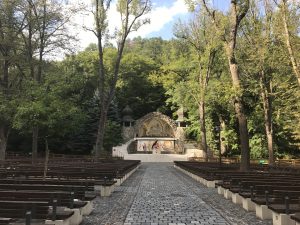The truly amazing atmosphere of Budapest during the Christmas holidays, all the beautiful lights, gold and glitter of the city I love so much.
The truly amazing atmosphere of Budapest during the Christmas holidays, all the beautiful lights, gold and glitter of the city I love so much.
 I’m the extremely proud winner of Travel and Hospitality Awards’ Private Tour Company – of the Year 2018 in Hungary. This is an award I appreciate a lot and it’s also a great feedback showing that my guests are happy with my services as their private Budapest tour guide. It’s time to celebrate!
I’m the extremely proud winner of Travel and Hospitality Awards’ Private Tour Company – of the Year 2018 in Hungary. This is an award I appreciate a lot and it’s also a great feedback showing that my guests are happy with my services as their private Budapest tour guide. It’s time to celebrate!
Budapest is beautiful day and night, surprisingly it’s like a totally different town when darkness falls. I enjoy very much touring in the city when one can enjoy its amazing lights especially looking at them from the Buda hills. Join my “The lights of Budapest” tour, so that I can show you the nicely lit buildings and tell you more about the stories of my city.
We decided to celebrate the National Day by hiking around the beautiful Buda hills. We hoped to enjoy some splendid view over Budapest from the top of the Elisabeth tower but couldn’t wait until the fog eventually lifted. It was a beautiful day shared with many other hikers who visited the area despite the sad weather.
I’m not exactly the person who gets invited to the Presidential Palace very often but we were very lucky with my guests last weekend when the doors of the Sándor Palace were open and the public could walk around the beautifully designed interior.
Compared to the relatively simple outside the interior is surprisingly richly ornate, at times I felt like walking around the Versailles Palace. The building is from 1806 and was the residence of the country’s prime minister from 1867. That’s when Queen Elisabeth or Sisi visited the handsome count Andrássy several times after enjoying a performance at the Castle Theatre next door.
The building was restored and became the seat of the offices of the President in 2003, the actual furnitures are reproductions of the originals. The entire restoration was conducted in accordance with the original blueprints. The garden is absolutely stunning with a great view over the Pest side. There is no guarantee we can tour the interior when you book a tour in the Buda Castle district but I’ll find a way to show you something just as beautiful as the Sándor Palace.
Yes, Pécs is one of my favorite destinations so I’d like to encourage you to book a tour at your earliest convenience. Once you have a look at the pictures below I’m sure you’ll fall in love with the city, too.
Pécs is very unique because the entire Hungarian history is on display in the city’s architecture, spirit and charm. You can learn so much while just walking around the cobblestoned streets.
We start the tour discovering the 1700-year-old Early Christian Necropolis, the well preserved burial chambers of the Romans fron the 4th century. We continue in the 11th century Basilica on Dóm square, an important symbol of the continuous fight of the Hungarians for Christianity. We tour the ruins of the Turkish baths, the only Turkish age mosque in Hungary that has remained intact together with its minaret and the 13th century Catholic church converted into a mosque in the 1540’s and reconverted into a Catholic church in the 1680’s. I’m sure you’ll be surprised to notice the special combination of the Muslim crescent moon and the Christian cross topping the church, reminding us of the peaceful coexistence of different religions. We admire the harmonious Baroque architecture and also have a look at the Vasarely museum.
After the city tour I take you to the Zsolnay quarter, the completely renovated and restored Zsolnay factory buildings where the most beautiful Hungarian porcelain and ceramic products have been manufactured since 1853.
We visited this cute little village last week as it was part of a family research I was working on for my guests arriving from Australia. I’ve never been to Szentkút before but I’m very much impressed by this enormous pilgrimage site, it’s just too bad it was deserted this part of the year. I understand it’s much more crowded in August when open air masses are held for hundreds of thousands of people.
The fountains have been famous for their healing power for some 700 years now and is declared a National Shrine since 2006.

The Hungarian “Székelykáposzta” is a great dish combining sauerkraut and pork stew, a nice meal to warm your body and soul on a cool day.
Drain 2.2 pound sauerkraut in a colander, rinse it gently under cold water and let it sit in the colander for a few minutes. Put half of the cabbage in a large saucepan, put in 1.3 pound diced pork rib and cover with the other half of the cabbage. Add 4 bay leafs and water to cover it and cook gently for 2 hours on low.
Heat 5.25 oz lard in a large saucepan on medium heat. Toss in 2 large chopped onions, cook them with a pinch of salt until they soften up. Remove saucepan from heat, stir in 3 teaspoon paprika powder with the onions until they’re fully coated. Put the saucepan back on the heat, turn it up to medium-high, and add 1.3 pound diced pork shoulder or leg. Cook until all the meat has browned. Once the meat is browned, add 1 tablespoon paprika paste or cream, 1 large chopped tomato and 1 diced bell pepper. Pour in water until it covers the meat, bring it up to a simmer, then reduce heat to low and cook slightly uncovered stirring occasionally for about 90 minutes.
Pour the pork stew in the cabbage stew, cook on medium low for 15 minutes, stirring occasionally.
Heat 1 tablespoon lard in a small saucepan on medium high. Add 2 tablespoon flour, stir until it’s browned, add 1 teaspoon paprika powder. Add 1 cup cold water, mix it and add the flour mixture to the cabbage. Add half of the sour cream, bring it up to a simmer.
You can serve the cabbage dish with the other half of the sour cream.
I guided several tours in the Northern part of Hungary this summer and Sopron has become my guest’s most popular destination, honestly, I can understand why. That’s the reason why this visit is part of my new tour to Győr and Sopron. The little town is situated near the border to Austria, a beautiful Baroque town rich in medieval architecture.
We refer to Sopron as to the most loyal Hungarian town because its citizens rejected the offer of Austrian citizenship in a referendum after WW1 when two thirds of the Hungarian territories got detached from our country. The anniversary of the referendum is celebrated every year.
During the tour we visit 13th century churches with Romanesque and Gothic structure, the Fire Tower, which is the town’s symbol since its construction in the 1600’s and apartment buildings from the 18th century. You’ll see where our great king Matthias was accomodated when he was besieging Vienna in 1482 and where Franz Liszt gave concerts in the 1800’s. I’ll also show you the ruins of the ancient Roman settlement, you can see the ruins of the town hall and the market from the Roman era.
We toured the Memento Park today, an amazing exhibition “in the shadow of Stalin’s boots”.
All the Communist monuments of Budapest were taken from our streets after the political changes as they reminded our people of the dictatorship, of the despotism of the Communist leaders. Instead of destroying them all – which idea was by the way supported by many of the Budapesters – some of these statues were installed in a thematical statue park in the 22nd district of Budapest. According to the conceptual designer, the “park is not about the statues or the sculptors but a critique of the ideology that used these statues as symbols of authority”.
I remember very well many of these statues standing on our streets, most of them had special nicknames and funny stories were also created about them. I’m happy to share these stories with you and tell you about the monumentality of the arts during the Communist era where the main objective was to create new idols to be adored by the proletariat. I’ll also tell you why you can see only the boots of Stalin, and I’ll introduce you to the ideology of the era which ended recently, some 28 years ago.